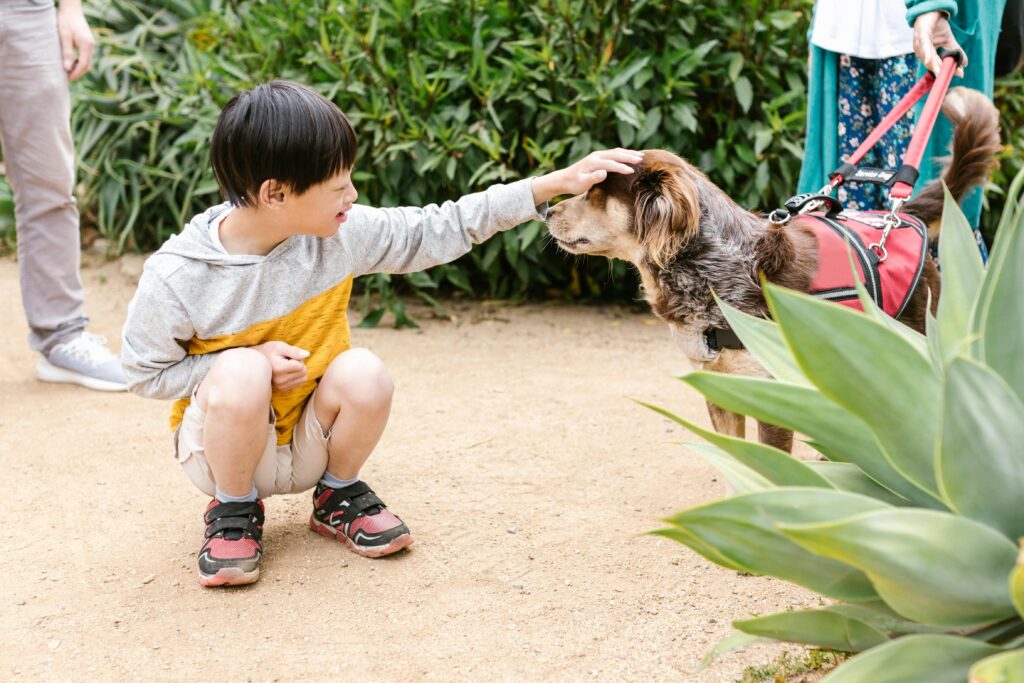
For families with a child on the autism spectrum, adding a dog to the household can be a life-changing decision. Dogs can offer unconditional love, companionship, and emotional support, often becoming a critical part of a therapeutic strategy. However, not all dogs are suitable for children with autism, and it’s important to consider several factors to ensure the best match.
Understanding the Benefits
Before diving into the selection process, it’s essential to recognize the benefits a dog can provide to a child with autism. These benefits include:
Emotional Support: Dogs can help reduce anxiety and stress, providing a calming presence that can help children cope with overwhelming situations.
Social Skills: Interacting with a dog can improve a child’s social skills, encouraging communication and the development of empathy.
Routine and Responsibility: Caring for a dog can help establish a routine, offering a sense of responsibility and accomplishment.
Important Factors to Consider
When choosing a dog for a child with autism, several key factors should be taken into account:
Temperament: The dog’s temperament is crucial. Look for a dog that is gentle, patient, and non-aggressive. Dogs that are calm and tolerant are more likely to be a good match.
Energy Level: Consider the energy level of both the child and the dog. A high-energy dog might be overwhelming for some children, while others may benefit from a more active companion.
Size: The size of the dog should be appropriate for the child’s comfort level and the living space available. Smaller dogs might be less intimidating, while larger dogs can offer a greater sense of security.
Training: Dogs that are well-trained or can be easily trained to follow commands are preferable. Service dogs specifically trained to assist children with autism can be especially beneficial.
Best Breeds for Children with Autism
While individual personalities vary, certain breeds are generally known for traits that make them suitable for children with autism:
Golden Retriever: Known for their gentle and friendly nature, Golden Retrievers are patient and great with children. They are also highly trainable and eager to please.
Labrador Retriever: Labradors are another popular choice due to their calm demeanor and reliability. They are affectionate, intelligent, and good with children.
Cavalier King Charles Spaniel: This breed is smaller in size and known for its friendly and gentle temperament. They are excellent companions and are particularly good with children.
Poodle: Poodles, including standard, miniature, and toy varieties, are intelligent and hypoallergenic, making them suitable for children with allergies. They are also easily trainable and adaptable.
Bernese Mountain Dog: Although larger in size, Bernese Mountain Dogs are known for their calm and friendly nature. They are patient and protective, making them good companions for children.
The Adoption Process
Once the ideal breed and temperament are identified, the adoption process should be carefully managed:
Involve the Child: Involve your child in the selection process to ensure they feel comfortable and excited about the new addition.
Meet and Greet: Arrange for several meet-and-greet sessions with potential dogs to observe interactions and comfort levels.
Professional Guidance: Consider consulting with a professional, such as a dog trainer or a therapist specializing in autism, to ensure the best match.
Gradual Introduction: Introduce the dog to the household gradually, allowing the child and dog to acclimate to each other at a comfortable pace.
Conclusion
Choosing the best dog for a child with autism involves careful consideration and planning. The right dog can provide immense benefits, from emotional support to the development of social skills. By focusing on temperament, energy level, and breed suitability, families can find a loyal companion that enhances their child’s life and fosters a supportive, loving environment.
Read more articles here!
- 9 Mental Health Benefits of Having an Emotional Support Animal
- 6 Effective Ways to Raise Awareness About Service Animals
- 6 Common Misconceptions About Service Animals
- How Do Therapy Dogs Keep Patients Calm?
Do you own an assistance animal? Register your pet today.
The Service Animal Registry of California invites you to have your assistance animal registered in order to designate its status. We also encourage you to take our online classes so you can be fully aware of your rights and gain more knowledge about your support animal.
Finally, we present to you our book entitled, “ASSISTANCE ANIMAL LAWS: LEARN YOUR RIGHTS REGARDING SERVICE ANIMALS, EMOTIONAL SUPPORT ANIMALS, THERAPY PETS, AND OTHER DOGS, CATS, AND ASSISTANCE ANIMALS” to provide you with a complete education on assistance animals.
Purchase your copy of the book by clicking the image below.
